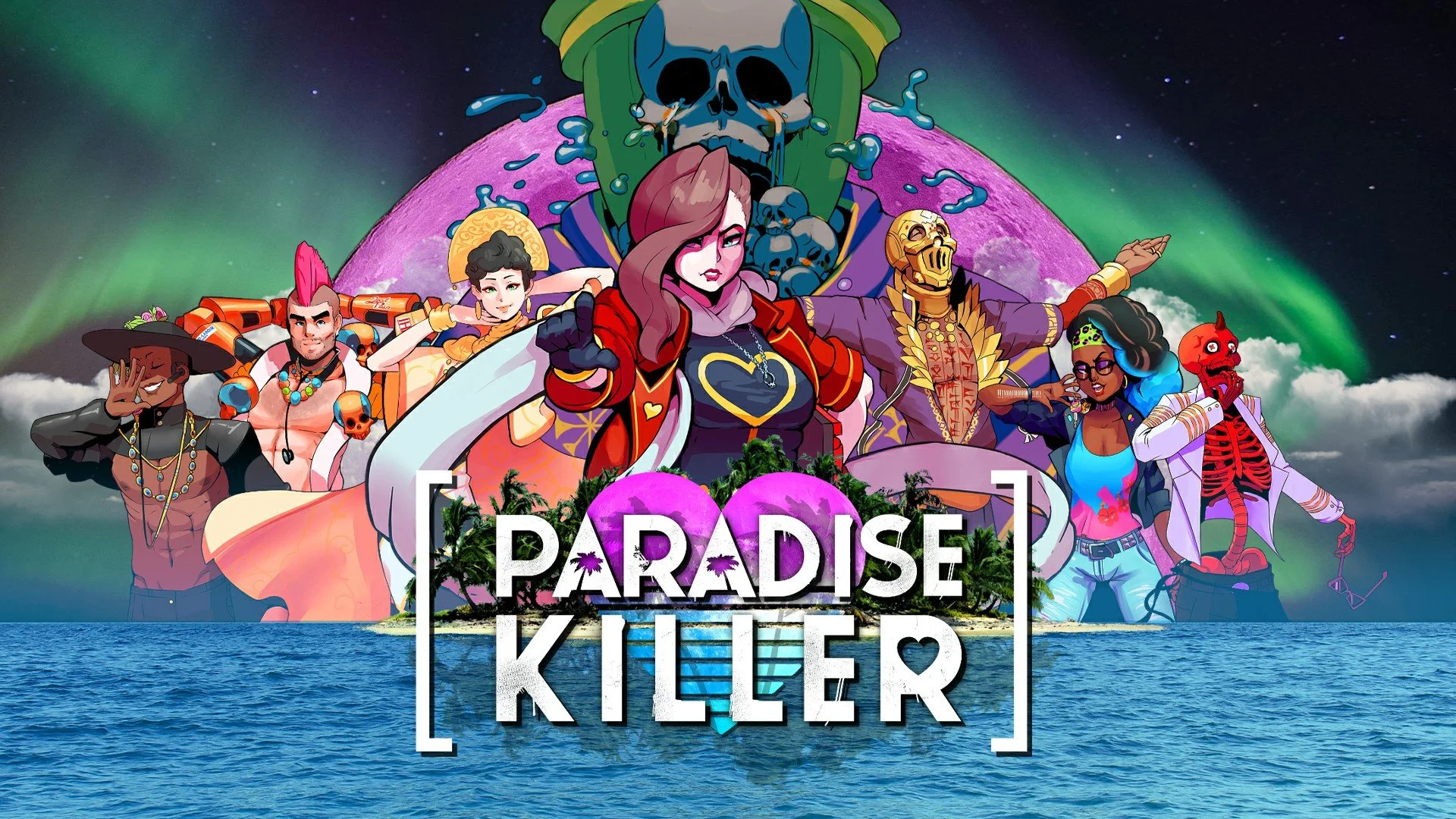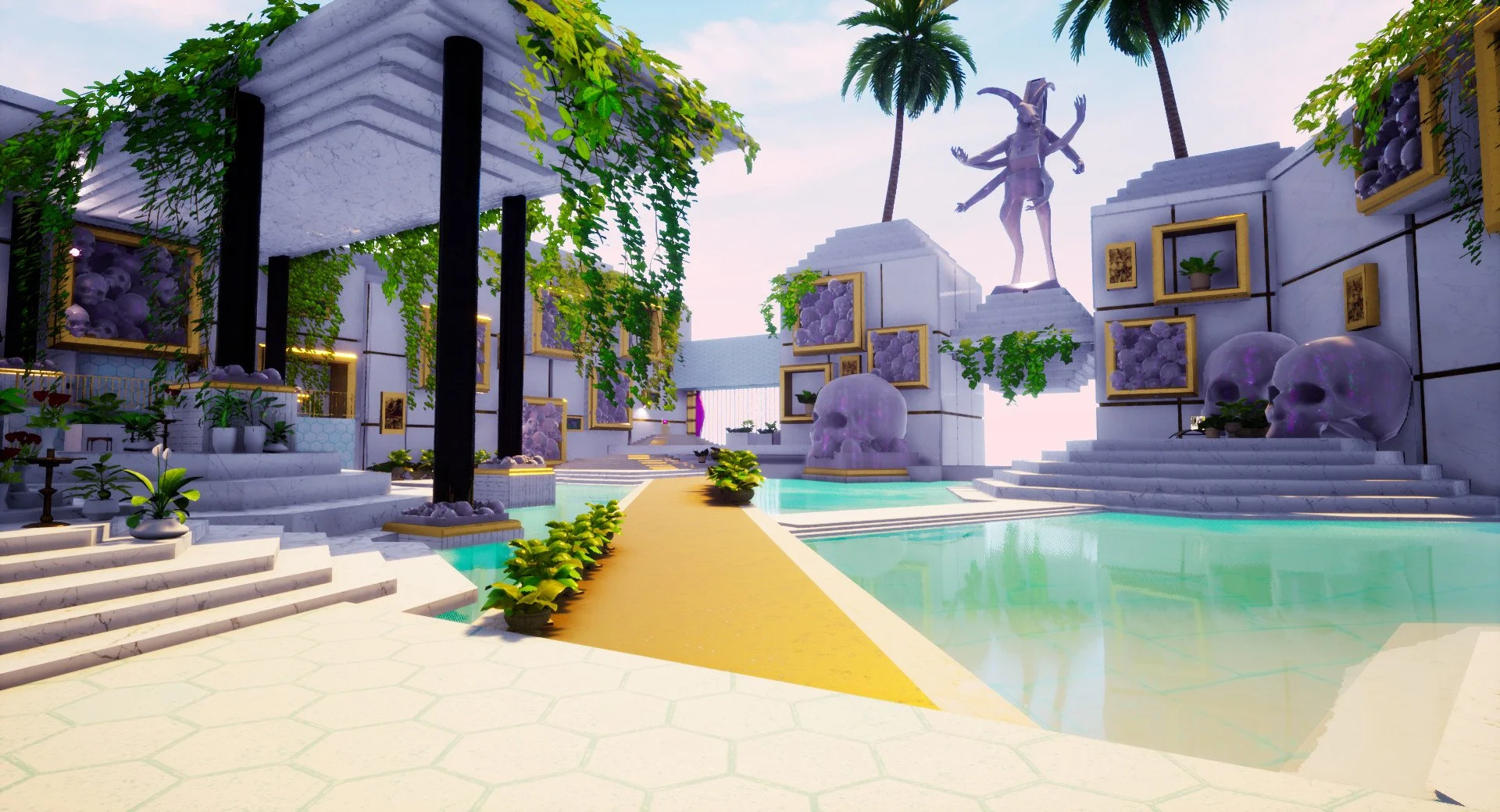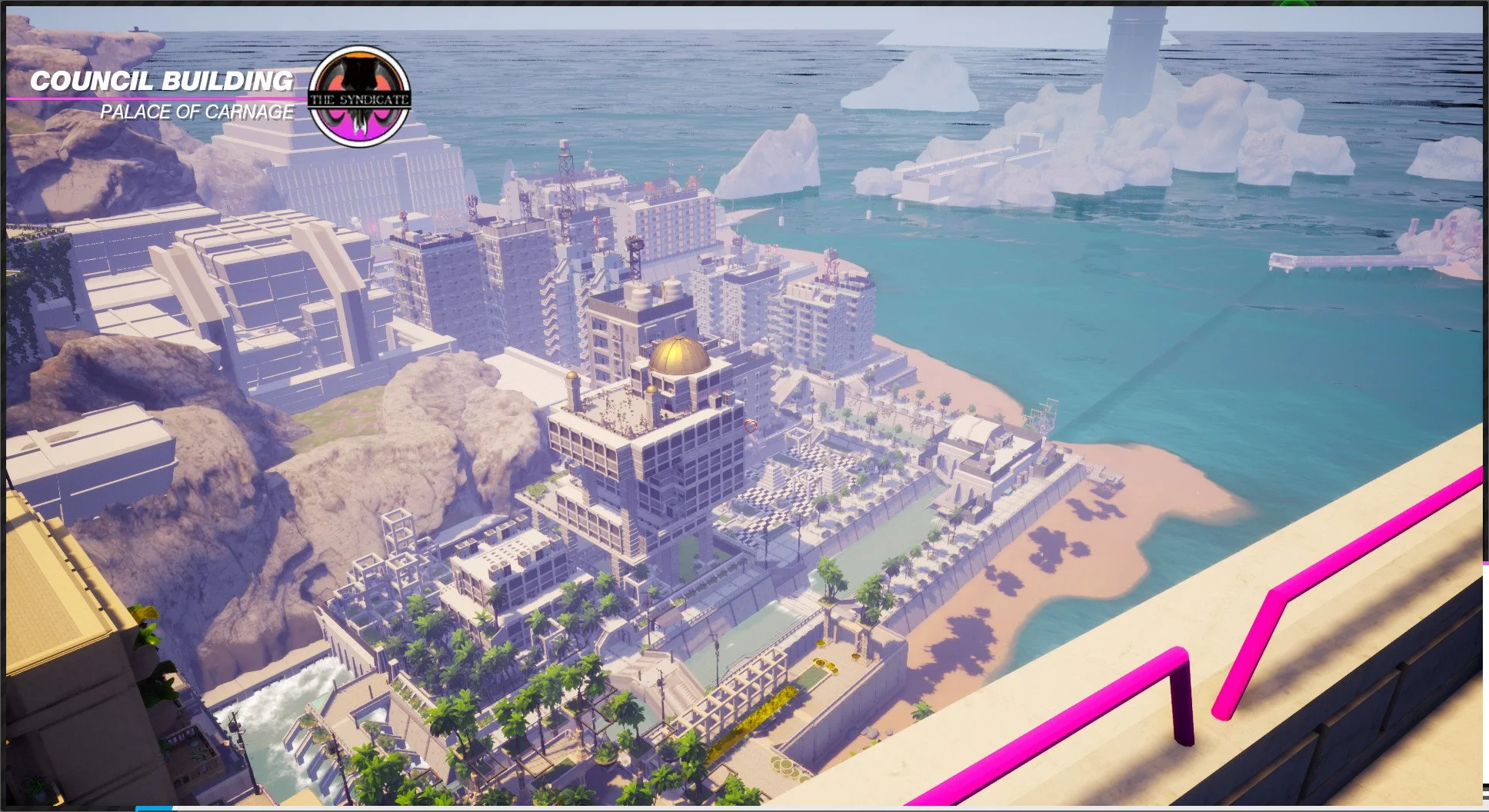Paradise Killer
Paradise Killer, from Kaizen Game Works, is an alluring blend of first-person open-world exploration and graphic novel storytelling with all the spice and intrigue of a neo-noir whodunnit. Lady Love Dies, an immortal investigator who’s been exiled for the last 3 million days, must now solve the crime to end all crimes. Island 24 may seem like a bountiful and opulent mecca, but beneath its chic surfaces lies an abundance of secrets and misgivings. It may feel daunting at first, but with its diverse characters, sundrenched cityscape, and enticing mystery, Paradise Killer does an outstanding job of immersing players in its utopia, which can only be described as vaporwave personified.
The gameplay is split into two parts: a first-person open-world investigation and an accusation-based testimony-laden trial. However, where one begins, and the other ends is your choice. Unlike other staples of this subgenre (looking at you, Phoenix Wright) Paradise Killer does not demand that every clue be hunted down or every suspect be spoken to in order to beat it. On the contrary, where and when the game ends is up to the player. You could start the trial without any investigation whatsoever. It all comes down to how you want to tell the truth. It’s an exciting innovation and it helps Paradise Killer stand apart from its peers. It also takes the pressure off an overly-saturated beginning to the game.
Paradise Killer is exceptionally dense at first glance. An opening text creeps across the screen set to the sounds of a moody saxophone and tepid drums. It’s heavy on atmosphere, but low on accessibility. While the text itself is minimal, the setting is flooded with too many unfamiliar elements at once: the history of the paradise islands, the tragedy that befell Lady Love Dies on island sequence 13, the current crisis on sequence 24, and finally flashing forward to sequence 25 for a cryptic conversation between two silhouettes. As overwhelming as this may be, stick with it. Survive the thicket of unrelatable world-building jargon, and you’ll be thoroughly rewarded as the open-world gameplay begins in earnest.
The investigation finds Love Dies wandering the streets, interrogating suspects, and searching for clues to how Island 24’s political leaders were all murdered. Exploring the island is an immediate draw. With no invisible walls to stop you, everything is within reach. Almost any building or cliffside can be scaled, and your character can survive any fall. Curious what might be out-of-bounds or a dead end? Go see for yourself. Love Dies moves through the world at a satisfyingly-brisk pace. While mobility upgrades, such as a double jump, and mid-air dash only add to the delight and scope of her exploits. Nearly every boundary in Paradise Killer is begging to be broken, and around each turn could lie new clues or new characters.
Everyone you meet is a suspect and suspects will tell you anything but the full truth. The cast of Paradise Killer are all thoroughly adamant they had nothing to do with the murders of their precious leaders, so it’s up to you to sift through their denials and accusations. Love Dies can question each suspect as often as she chooses, and uncovering more leads will yield new interrogation options as you progress. The game not only lets the player ask certain questions, but it also invites the choice of how to ask them. What’s the best way to maneuver each conversation? Play to a suspect’s ego, or confront them outright? Each character can be grilled, sweet-talked, or both. The alibis, testimony, and other evidence collected are all sorted in the games menu system, which feels a bit cumbersome at first, but will prove functional over time. As the story unfolds, and the island gets deeper, Paradise Killer makes it an absolute joy to find new facts and build out your case.
As Love Dies chisels away at this conundrum, an important element helps underscore the whole crusade: the music. Barry “Epoch” Topping has crafted a soundtrack that is both addictingly catchy and thematically relevant to the game. It pumps the player full of endorphins with synth-laden hooks, driving beats, and ethereal tones; knowing exactly when to relax and when to amp things up. It brings a special attention to the world of the game, which is faithfully rooted in the style of vaporwave.
Glitch art graphics, old commercials, even slowed-down synthed-up versions of easy listening tunes, vaporwave is all about messing with your memory. By bringing many nostalgic components together, the subgenre is jokingly reminiscent of the hollow promises and empty aspirations of bygone eras. It takes a cynical view of the past and mockingly points at what society was striving to achieve back then: manufactured motivations fed to us by single-minded corporations.
Enter Paradise Killer: a game about a government that controls and harvests the energy of its citizens, and is literally creating and destroying new utopias over and over again in an attempt to achieve their idea of “perfection.” Now, suddenly, the rulers are dead on the eve of starting a new society and blowing up the old one. Anyone else seeing a connection here? You have to give Kaizen Game Works credit as the themes of vaporwave emanate not just from the music, and the story, but from every inch of Island 24.
The entire island’s textures are purposefully flat and are not only meant to emulate those of a vaporwave music video, but also of older video games. It immediately felt like playing a high-definition Dreamcast game. Just a few steps onto the island sent me back to the countless hours I spent as a kid wandering around the Mystic Ruins in Sonic Adventure. Even the collectibles are soaked in vaporwave. Whether it’s evidence pertaining to the case, in-game currency, or historical mementos, nearly every collectible is layered in a 2-D glitch art style.
More importantly, the placement of these items adds a new layer of challenge and remuneration to the expedition. Paradise Killer wants you to stray from the main objective. While chasing down new leads, don’t be surprised to look up and see a blood crystal (the in-game currency) dangling from a rooftop, or a smart-alecky demon named Shinji suddenly perched on the precarious cliffs in the distance. Again, the game does not require Love Dies to seek out all these goodies, but Paradise Killer will consistently reward those willing to lean into their wanderlust.
For some ungodly reason, however, you have to press the A button to climb ladders. Yes, this is small, but it was consistently annoying to do this over and over. It’s all the more frustrating considering how easy it would have been to omit this from the game. But, at the same time, this is yet another nostalgic aspect of old video games. There were always instances of a game’s mechanics getting in the way of playing the actual game; either resulting in a cheap death or just sheer annoyance. Let’s go out on a limb and say, this was Kaizen Game Works’ plan all along, they’ve earned it.
That said, once the player elects to begin the trial, the first-person exploration ostensibly ends, and we enter what amounts to a “choose your own suspect” courtroom scene. The only choices of consequence will be who to accuse, and what evidence to present. Which, to the game’s credit, does provide an air of suspense and excitement. However, it is by far the most passive stretch of Paradise Killer. Anyone looking for further innovation on Phoenix Wright’s testimony and evidence system will not find it here. There will be no further puzzles to solve, only choices to make.
Upon completing the game, the urge to replay it in its entirety will be minimal. Hunting down every single clue takes around 15 hours, and nothing really changes when you restart since the evidence is all the same. The end-game trial can be steered in different directions, which is a nice touch, but all guilty verdicts end the same way too. So the idea of telling the truth differently just for the sake of seeing a different person be put to the same sentence isn’t all that exciting. Though, the game does deserve credit for hammering home the point that anyone can be found guilty depending on the narrative.
Paradise Killer is a thoroughly enjoyable murder mystery adventure whose anarchistic themes and vaporwave aesthetics permeate from every corner of the screen. Its story may initially overwhelm, but it’s loaded with intrigue. The soundtrack will be a Spotify mainstay for weeks after playing. And, though its ending may be light on gameplay, it’s heavy on justice. Was it the justice the story deserved? That’s up to you. Time to breathe life back into Paradise.
VERDICT: Must Play




